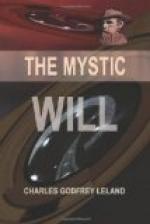“All day within the
dreary house
The doors upon their hinges
creaked,
The blue fly sang in the pane,
the mouse
Behind the mouldering wainscot
shrieked,
Or from the crevice peered
about;
Old faces glimmered thro’
the doors,
Old footsteps trod the upper
floors,
Old voices called her from
without.”
Yet even this unsurpassed poem does no more than partially revive and recall the reality to me of similar memories of long, long ago, when an invalid child I was often left in a house entirely alone, from which even the servants had absented themselves. Then I can remember how after reading the Arabian Nights or some such unearthly romance, as was the mode in the Thirties, the very sunshine stealing craftily and silently like a living thing, in a bar through the shutter, twinkling with dust, as with infinitely small stars, living and dying like sparks, the buzzing of the flies who were little blue imps, with now and then a larger Beelzebub—a strange imagined voice ever about, which seemed to say something without words—and the very furniture, wherein the chairs were as goblins, and the broom a tall young woman, and the looking-glass a kind of other self-life—all of this as I recall it appears to me as a picture of the absence of human beings as described by TENNYSON, plus a strange personality in every object— which the poet does not attempt to convey. This is, however, a very small or inferior illustration; there are far more remarkable and deeply spiritual or aesthetically-suggestive subjects than this, and that in abundance, which Art has indeed so reproduced as to amaze the many who have only had snatches of such observation themselves.
But the magicians, SHELLEY, or KEATS, or WORDSWORTH, only convey partial echoes of certain subjects, or of their specialties. It is indeed beautiful to feel what Art can do, but the original is worth far more. And if the reader would be such a magician, let him give his heart and will to taking an interest in all that is beautiful, good and true—or honest. For that it really can be done in all fullness is true beyond a dream of doubt. By the ordinary methods of learning one may indeed acquire an exact, mechanically drawn picture, which we modify with what beauty chance bestows. But he who will learn by the process which I have endeavored to describe, or by studying with the will, cannot fail to experience a strange enchantment in so doing, as I have read in an Italian tale of a youth who was sadly weary of his lessons, but who, being taken daily by certain kind fairies into their school on a hill, found all difficulties disappear and the pursuit of knowledge as joyful as that of pleasure.




